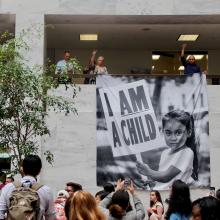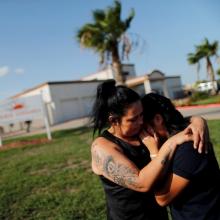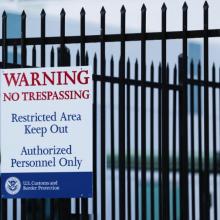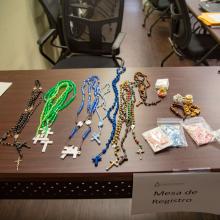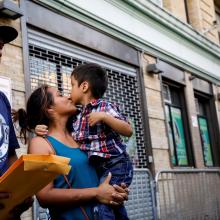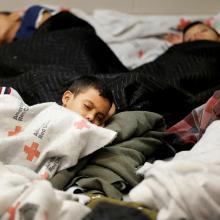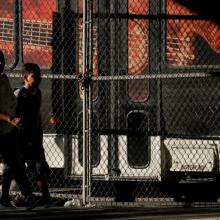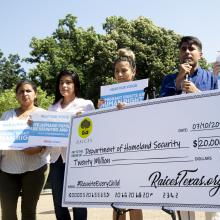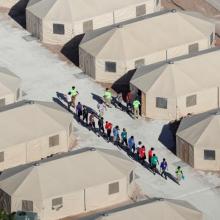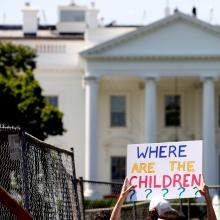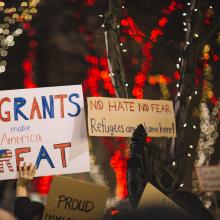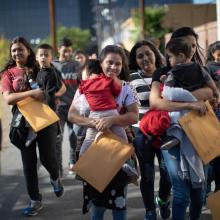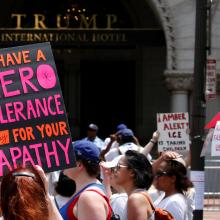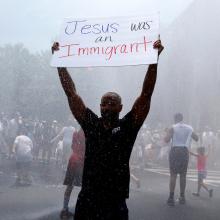family separation
Earlier this week, it was reported that at least 460 parents may have already been deported without their children, leaving reunification possibilities unclear.
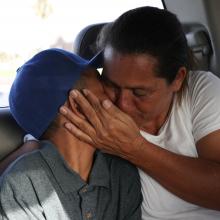
Maria Marroquin Perdomo and her 11-year-old son Abisai drive away from the Casa Padre facility in the backseat of her attorney's truck minutes after mother and son were reunified in Brownsville, Texas, U.S., July 14, 2018. Abisai was held at Casa Padre while his mother was detained at the Port Isabel detention facility. REUTERS/Loren Elliott
Marroquin Perdomo gave her son a set of colorful handmade cards she had made for him in detention. On one of them, she had drawn flowers surrounding a Bible verse – Salmos (Psalms) 121:8.
It reads in English: “The Lord will watch over your coming and going both now and forevermore.”
Chad Belew, pastor of The Arsenal, a non-denominational church south of downtown San Antonio, understands the pressure to keep a low profile on political issues or run the risk of alienating his congregation. But he also believes that silence is deadly, spiritually speaking. He quotes Martin Luther King, Jr. “Our lives begin to end the day we become silent about things that matter.”
A woman named Leydi, held in Chula Vista, Calif., described watching young children trying to touch their parents through metal fences.
“The mothers tried to reach their children, and I saw children pressing up against the fence of the cage to try to reach out," she said. "But officials pulled the children away and yelled at their mothers."
Parents who have just been reunited with their children — after being separated, some for months, amid the implementation of the Trump administration’s “zero tolerance” immigration policy — are offered food, clothes, toys, and other essentials and are paired with background-checked volunteers to help them through the next steps of the process.
On July 10, after examining how an initial wave of reunifications of young children had gone, Sabraw concluded that government vetting policies could be streamlined to speed the process.
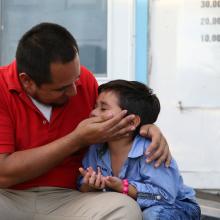
Walter Armando Jimenez Melendez, an asylum seeker from El Salvador, arrives with his four year-old son Jeremy at La Posada Providencia shelter in San Benito, Texas, U.S., shortly after he said they were reunited following separation since late May while in detention July 10, 2018. REUTERS/Loren Elliott
"They took the children from us without any explanation," said Isabela, who asked that only her first name be used. "I felt I had lost her, that I could not find her."
Are locked in detention as part of some plan,
May we be reminded that you love them, too;
They’re made in your image; they’re precious to you.
After praising a child detention center in Virginia, White responded to immigration advocates, saying, "I think so many people have taken biblical scriptures out of context on this, to say stuff like, 'Well, Jesus was a refugee.' Yes, He did live in Egypt for three-and-a-half years. But it was not illegal. If He had broken the law then He would have been sinful and He would not have been our Messiah."
RAICES Texas — the San Antonio-based immigration legal services provider that has received tens of millions of dollars via a viral Facebook fundraising campaign launched amid the family separation crisis at the border — today announced a plan to distribute $20 million of their funds: give it over to the Department of Homeland Security to “post bonds” for mothers being held in detention.
1. Women Faith Leaders Bear Witness at the U.S.-Mexico Border
“Gloria Anzaldúa famously referred to the U.S.-Mexico border as una herida abierta — an open wound. … But if the border is a wound, then perhaps we can best describe our nation as doubting Thomas before his encounter with Christ.”
2. Americans Are Having Fewer Babies. They Told Us Why.
From The New York Times. Spoiler alert: Babies are expensive.
U.S. Judge Dana Sabraw in San Diego last month ordered the government to stop separating children from immigrant parents entering the United States illegally and set deadlines for the government to reunite families.
It is time for people of faith and conscience to demand nothing less than an immediate and complete reunification of separated families — and demonstrate our willingness to play a role in this process. We have spoken out to stop the separation, but we still have the moral imperative to fix it for those who have been torn from their parents. I have recently been in meetings with bipartisan groups of senators who want to see this issue fixed, who care very deeply about finding lasting solutions, and who are asking for the help of the faith community.
There’s always been a deep tension between those who believe the powerful words about freedom for all and those who believe that such freedom should be reserved to them alone. There have always been those who believe that their personal freedom is unbreakable but the freedom of others can be rationed.
We in the church have clung too tightly to our country’s myths of exceptionalism. We’ve been too slow to name the real “terror within” and unwilling to listen to those telling us of terror all around. We’ve been reluctant to own up to our history and speak out against unjust policies . We don’t like to think or talk about it, but most of us know that our quality of life here comes directly at the expense of everyone else on the planet (not to mention the planet itself), millions of ordinary folks whose countries have been ravaged by centuries of colonialism and persistent neocolonial structures, who make our clothes and gadgets, grow our food and coffee, and pay in countless other ways for all our out-of-control consumption and addictions. Their problems are our problems. So we can’t set them aside.
Last week, I joined a delegation of 14 women faith leaders, organized by Faith in Public Life, to speak with refugees and community activists about our government’s treatment of immigrants at the border. We went expecting to encounter a community’s pain, but I don’t think any of us were prepared for the trauma we found, nor the fierce resistance of those standing up for migrants’ humanity.
More than 10,000 protesters gathered at Foley Square in downtown Manhattan Saturday morning to march against the Trump administration’s policy on immigration. The New York march was part of a nationwide series of rallies organized by advocacy groups, legal and immigrants’ rights organizations, trade unions, and concerned citizens.
Thousands of protesters clad in white and armed with signs denouncing President Donald Trump rallied Saturday in more than 90-degree heat against the Trump administration’s immigration policy and the “zero-tolerance” approach that has separated children from their parents after they crossed the border from Mexico to the U.S.
Tens of thousands gathered in Lafayette Park in Washington, D.C., Saturday to call for an end to family separation. Braving a scorching 95-degree heat, people had come from all over the country to attend the Families Belong Together event. Organizers had three demands for President Trump: Reunite families, end family detention, and reverse the “zero tolerance” policy.
Tens of thousands of protesters marched in cities across the United States on Saturday to demand the Trump administration reverse an immigration crackdown that has separated children from parents at the U.S-Mexico border and led to plans for military-run detention camps.
